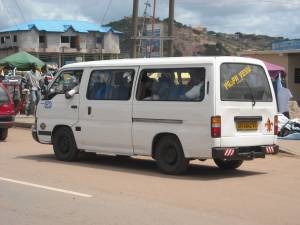By Kwasi Addae Owusu (MSc Logistics and Transportation Mgt.)
Transport Manager, Ministry of Health, Accra
26th August 2025
Transportation is one of the most fundamental pillars of social and economic life. In Ghana, mobility for the majority of citizens depends on public transport, and at the heart of this system is the trotro, the aging minibuses that ferry millions daily across towns, cities, and villages.
The trotro is more than just a vehicle. It is an institution, an icon, and for many Ghanaians, a daily struggle. To understand the challenges of ordinary people, one only needs to ride in a trotro.
The Lifeline of Daily Commuting
More than 70% of Ghanaians depend on informal public transport trotros, taxis, motor tricycles for their daily movement. Unlike formal systems with fixed timetables, trotros are run by unions and operate with little regulation.
They thrive because they are cheap and accessible. A ride from Accra to Madina costs a fraction of what a ride-hailing app would charge. But affordability often comes at the expense of safety, comfort, and reliability.
Unsafe Journeys
Most trotros are second-hand vehicles imported long past their prime. Poor maintenance means constant breakdowns, accidents, and, too often, loss of life. For passengers, safety concerns aren’t abstract they are lived realities.
When Transport Blocks Learning
For schoolchildren, unreliable transport has severe consequences. Delays caused by overcrowded stations or breakdowns mean lateness to class, shorter study hours, and, in rural areas, even dropping out. Many families, especially when money is tight, simply cannot afford both school fees and daily commuting costs. Girls are often the first to be withdrawn.
Health on Hold
Transport is a hidden factor in health outcomes. Patients with chronic illnesses, pregnant women on their way to antenatal care, and parents rushing sick children to hospital all depend on trotros. When transport is unreliable, the result is delayed treatment and worsening conditions.
Women Carry the Heavier Burden
Market women, street vendors, and caretakers make multiple trips each day, balancing goods, children, and household duties. Long hours in traffic or waiting at stations eat away at their productivity and well-being. Transport inefficiencies cut deeper into women’s lives than men’s.
The Cost of Lost Hours
Ghana’s economy bleeds productivity because of poor transport. Workers spend hours in gridlock, arrive late, and return home exhausted. For the self-employed, unreliable commuting disrupts business and shrinks already fragile incomes. Each wasted hour is a lost opportunity.
Not Just Ghana: A West African Struggle
Ghana is not alone. Across West Africa, minibuses dominate public transport, reflecting rapid urbanization and weak regulation.
Nigeria (Danfo): In Lagos, danfos are infamous for reckless driving and dilapidation. A Bus Rapid Transit (BRT) system was introduced, but coverage is still limited.
Senegal (Car Rapide): Dakar is phasing out its colorful car rapides for modern buses, though the transition has displaced drivers.
The story is the same: transport is not just about moving people; it reflects deeper inequalities and poor urban planning.
Missed Opportunities in Ghana
Successive governments have acknowledged the transport crisis, but reforms have often stumbled.
Ayalolo BRT: Launched in 2016, Accra’s Bus Rapid Transit was meant to modernize commuting. But with poor planning, no dedicated lanes, and political interference, the system collapsed within years.
Urban planning: Rapid urbanization has outpaced transport design. Pedestrian walkways, bike lanes, and efficient traffic systems remain scarce.
Weak regulation: Unions like GPRTU wield power, but their operations often favour members, not passengers. Fare controls and safety standards are poorly enforced.
A Way Forward
Ghana cannot continue to patch a broken system. Real change requires treating transport as a social policy, not just an economic issue.
Invest in mass transit: Revive and expand the BRT with dedicated lanes, modern buses, and political commitment.
Support the vulnerable: Introduce transport subsidies for students, the elderly, and low-income workers.
Enforce safety: Mandate roadworthiness checks and professionalize driver training.
Rethink urban design: Build walkways, bike paths, and traffic systems that prioritize efficiency.
Learn regionally: Adapt lessons from countries like Senegal, which is gradually formalizing its system.
A Mirror of Society
The trotro is more than a rusty minibus. It mirrors Ghana’s resilience and ingenuity, but also the systemic neglect of infrastructure, regulation, and planning.
Transportation is not just about movement. It is about opportunity, dignity, and equality. Until Ghana addresses its trotro troubles, the struggles of ordinary citizens will continue to play out crammed into old seats, stuck in endless traffic, and held back from realizing their full potential.
The question is not whether Ghana can afford to fix its transport system. The real question is: can we afford not to?

